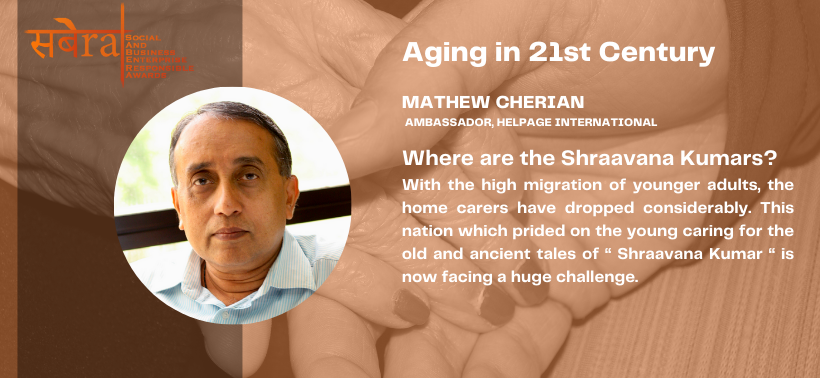Grey Tsunami
At the turn of the millennium, as per the Indian census of 2001, we were 81 million people. Today we are closer to 140 million senior citizens and added twice the entire population of Canada to the senior citizens in 20 years. With such a demographic explosion is ageing an opportunity or a complete disaster. Some refer to it as the approaching Grey Tsunami. If we do nothing we will be overwhelmed by an ageing population with no health care or pensions. The recent COVID pandemic exposed how vulnerable India was towards older people at risk with comorbidities. Unless we put primary health care at the centre of planning and make it reach out to all rural districts there will be no hope for the senior citizens.
There are 3 primary needs of older people mainly primary health care, social security and pensions and long term care. With the migration of 140 million young adults to urban pockets, leaving their parents and grandparents in the villages has become a social reality. With growing unemployment and lack of proper jobs, this trend is likely to grow.
Equitable health services
There is a huge asymmetry in the level of health system capacity and efficiency across the country, between various states, and within each state’s urban and rural areas. Sometimes you find district to district differences as well. There is much difference between a tribal pocket and a non-tribal area. We need to talk about the geographic diversity that exists. We need to recognize that the availability of efficient and equitable health services is not a given in every part of the country. And that is what we need to correct first. Let us say you take universal health coverage as the ultimate goal. Take the WHO CUBE which is conveniently framed in three dimensions of population coverage, service coverage and cost coverage, and say that this cube should be progressively filled based upon the availability of resources. We recognize that with respect to the first dimension, that is population coverage, it is primary care that’s truly universal. Everybody needs some type of primary care some time in life, whether it is immunization or whether it is even normal delivery care. There are so many things that come under primary care. Then, if you take service coverage, the largest package of services will be under primary care because virtually most conditions are covered there. And if you take cost coverage, primary care is the most cost-efficient way of delivering services. And they’re mostly going to be very resource-conserving in terms of avoiding unnecessary advanced care by prioritizing early prevention and care. The neglect of primary care, in many states of India, has actually cost India quite a lot. It can prove disastrous for older senior citizens in the 21st century.
Pension
Pension provision and social security is not available for the poor and vulnerable elderly. Only 10 % of the elderly in India receive pensions who have either retired from government service or defence services. The poor elderly who comprise 51 million out of the 140 million do not get any pension or even the Re 200 per month from the National Social Assistance Programme or Indira Gandhi Pension Yojana. This is as it is an undignified amount with such a high cost of living and has not been changed for the last 20 years. The 21st century has been very unkind to the poor senior citizens who live in penury.
Long term care
With the high migration of younger adults to cities and the increasing loneliness of older people, the home carers have dropped considerably. This nation which prided on the young caring for the old and ancient tales of “ Shraavana Kumar “ is now facing a huge challenge. The plight of 22 million widows in India is another challenge amidst the elderly and is more pronounced in the religious cities of Vrindavan, Kashi and Kanchipuram. We need to provide long term care and long term care beds as the trends point towards home caregivers not being available to care for them in the 21st century.
SABERA helps amplify Responsible Leadership and voices committed to GOOD.
Views are personal. The author Mathew Cherian is the Chair, CARE India, Ambassador HelpAge International. Mathew is also a jury member on सबेरा SABERA 2021
If you or your organisation are aligned to the sustainable development goals or ESG and sustainable business practices सबेरा SABERA 2021 jury is looking forward to your work. To submit criteria based information for your responsible work Register here.
Follow us on Linked in, Twitter, YouTube to never miss an update from SABERA.
You may also like the article Democracy in the Age of Internet


